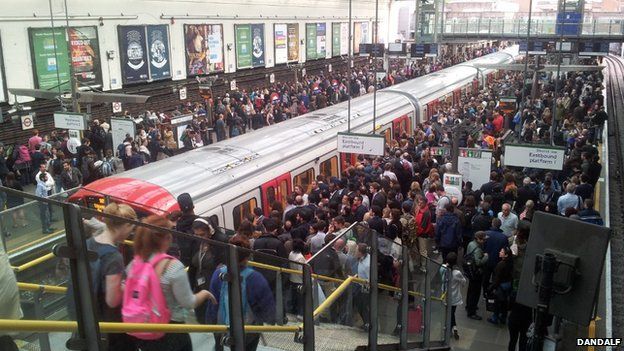Why are we in for the biggest Tube strike since 2002?
- Published
- comments

We are all set for the biggest Tube strike since 2002 when the four main transport unions walk out on Wednesday evening. Why?
This is a dispute over the changes to working conditions imposed by London Underground (LU) to bring about the new Night Tube on 12 September and it is also about pay.
You can mix into that the bad feeling and poor industrial relations, particularly over the ongoing closure of ticket offices and 800 job losses.
The Night Tube will mean services running for 24 hours through the night on Fridays and Saturdays on the Jubilee, Victoria, Northern, Piccadilly and Central lines, with trains every 10 minutes.
That is undoubtedly a popular idea and an independent report says it will have a Benefit to Cost Ratio (BCR) of 3.9:1. Therefore for every £1 spent it will generate £3.90.
London Underground says it has recruited another 137 drivers for the Night Tube and staff will have to work seven more overnights a year with no increase in their hours, although LU argues some staff already work some overnight shifts.
ASLEF - the biggest drivers' union - says its drivers will have to work 15 overnights a year and the rosters will destroy any work-life balance.
To sweeten this overnight pill, LU at the last minute came in with a pay rise of 2% in 2015 and a one-off non-pensionable £500 bonus for all staff.
It also offered a further £2,000 for Tube drivers affected by Night Tube. That is 11 depots and about a third of drivers.
Network Rail and DLR got 2% pay rises recently.
The offer led to accusations London Underground had carried out a "cynical and divisive attempt to undermine our solidarity".
The four unions represent about 20,000 Tube workers. Without them LU says the Tube will start running down from 18:00 on Wednesday and there will be no Tube at all for all of Thursday.
The strike is meant to last for 24 hours but the disruption will last considerably longer than that. There are different start times for different unions and LU are warning there could be disruption into Friday's rush hour. So, the reality is it is more like a 36-hour strike.
One question remains - why were these negotiations over a flagship Tube policy left until the last minute?
- Published22 June 2015
- Published16 June 2015
- Published6 May 2011
- Published2 February 2015